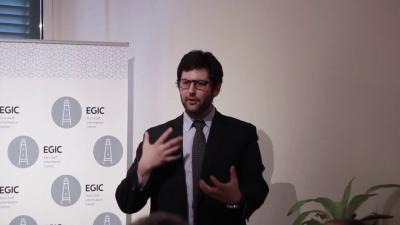'Middle East should emulate EU federalism,' experts say

ROME- In the past few years two diplomatic crises (the threats to the stability of the EU and the Middle Eastern situation) have intertwined. But if in the past months the EU has stabilised itself, while the Levant has experienced further politcal difficulties. According to many, the EU must, form its newly found position of strength, lend a helping hand to Middle Eastern countries. On Wednesday, in the historical via Gregoriana, a panel of experts chaired by the Euro-Gulf Information Centre (EGIC), met to discuss the various crises in the Middle East, and how both the European Union and Italy are responding to it. Cooperation, and even emulation, could be the solution of the Middle Eastern crises.
The panel comprised of two key speakers, Dr. Guido Lenzi (former Ambassador and Professor of International relations at the University of Bologna) and Umberto Profazio (analyst at the Centre for Geopolitics & Security Studies & NATO Defence College Foundation). The meeting was chaired by Mitchell Belfer, president of EGIC and international relations expert.
Dr. Lenzi opened the evening with a presentation on the historical roots of the middle eastern crises, especially in regards to the failure of Pan-Arabism and the hardship middle eastern nations are facing while building a national identity, or even a national polity.
This formed a fitting prelude to the following presentation by Dr. Belfer, who discussed NATO and EU policy towards the middle east, especially in regards to the Qatari and GCC (Gulf Cooperation Council) crisis.
Lastly, Dr. Profazio delivered a presentation on Libya, his area of expertise. Profazio explored the contrasts between French and Italian foreign policy, along with the instability and indecisiveness caused in the diplomatic relations by the recent American presidential election.
In each of their presentations the speakers addressed three major objectives of both EU and Italian foreign policy, namely the curtailing of illegal immigration, the annihilation of the threat of Islamist terrorism, and support for democratic and moderate regimes, especially if organised on a federal basis such as the European one. ''The Middle East'' said Dr. Lenzi ''should emulate the EU's ferelaist model''.
One of the key points, made painfully clear by the speakers, was that the European support for a federal model in the middle east which would mirror their own does not come from arrogance or even a position moral superiority. On the contrary, it stems from the knowledge that Europe 80 years ago was the unstable region which the middle east is today, and after two world wars only the institution of federalism managed to prevent a third.
The EGIC is an organisation which aims at opening up dialogue and relations, both economic and political, between the members of the European Union and Middle Eastern countries.


